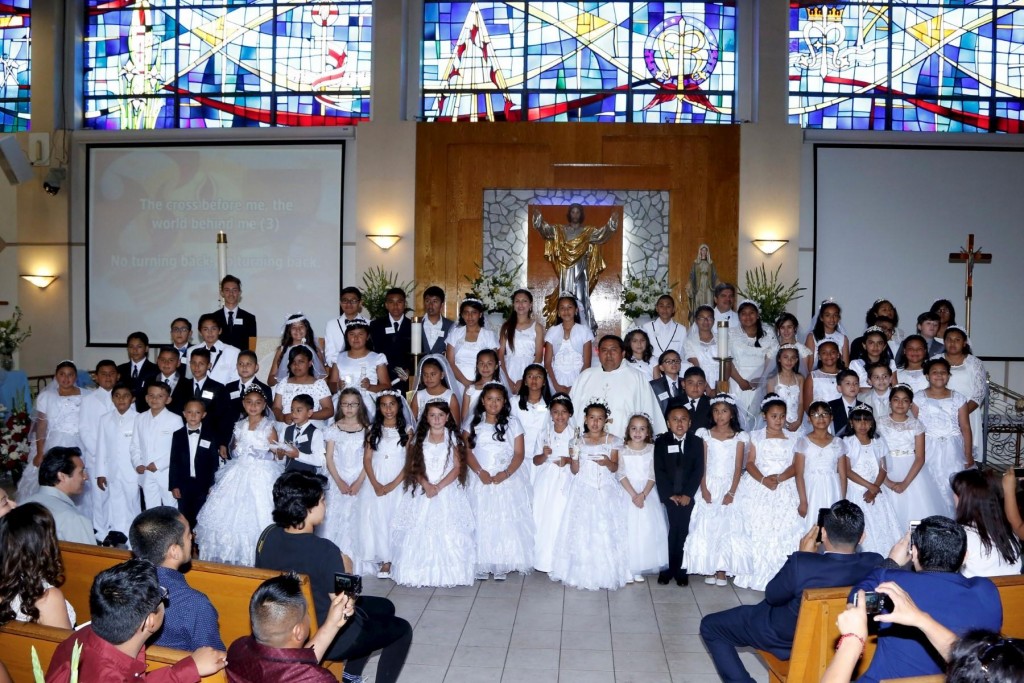Hope and Life

Children of Family Catechism after Receiving their First Communion
Tenth Sunday in Ordinary Time
Today’s readings tell the story of two widows. The first reading relates the plight of the widow with whom the prophet Elijah stayed; the Gospel tells about the widow of Nain. In each story, the widow’s only son had died. For people who lived in those cultures, the son was the only support of a widow, and the carrying on of the family name by the son was equal to immortality. A widow whose only son has died could lose all hope. Elijah and Jesus are the restorers of hope; they bring the sons back to life. Saint Paul was metaphorically raised from the dead when he experienced the conversion and call from God that he describes in today’s second reading. What are Christians called to do today? We may not be able to raise the dead, but perhaps we can rekindle hope for a single parent. We may not be able to convert a persecutor like Paul, but if we speak the gospel openly and gently with our lives, we might touch a life with the Good News.
Readings for the Week
Monday: 1 Kgs 17:1-6; Ps 121:1bc-8; Mt 5:1-12
Tuesday: 1 Kgs 17:7-16; Ps 4:2-5, 7b-8; Mt 5:13-16
Wednesday: 1 Kgs 18:20-39; Ps 16:1b-2ab, 4, 5ab, 8, 11; Mt 5:17-19
Thursday: 1 Kgs 18:41-46; Ps 65:10-13; Mt 5:20-26
Friday: 1 Kgs 19:9a, 11-16; Ps 27:7-9abc, 13-14; Mt 5:27-32
Saturday: Acts 11:21b-26; 13:1-3; Ps 16:1b-2a, 5, 7-10; Mt 5:33-37
Sunday: 2 Sm 12:7-10, 13; Ps 32:1-2, 5, 7, 11; Gal 2:16, 19-21; Lk 7:36 — 8:3 [7:36-50]
Treasures from Our Tradition
Unless Professor Einstein’s theory of relativity can be translated into any useful kind of time travel, most of our clues about life in the early church will have to come from ancient letters and ancient prayer texts. A prayer text from a dusty library may yield, for example, an understanding of what “presbyters” actually did. We have such a prayer from the early third century from the hand of Hippolytus of Rome. While our modern prayers derive a great deal from his, some of the practices of the ancient church have fallen away. In his day, bishops were chosen by the people, and the other bishops merely consented. Presbyters, by contrast, seem to have been chosen by the bishops. This makes sense, since it allowed the bishops to hand-pick their most trusted advisers. It seems that bishops were at first reluctant to share their presiding at the Eucharist with presbyters. In fact, by the time of the fourth-century church’s growth spurt in Rome, the bishop sent deacons out with fragments of the host from his Eucharist to drop into the chalices of the presbyters at the outlying Eucharistic celebrations. We still have a vestige of this fermentum in the Mass today, a reminder of the early bishops’ desire to give a powerful sign of the unity of all celebrations of the Eucharist with their ministry, and a clue to their reluctance to delegate a sacramental ministry to the presbyters.
